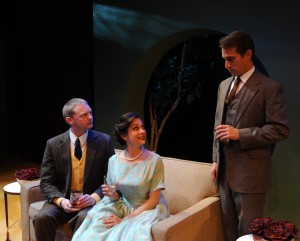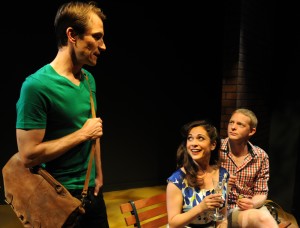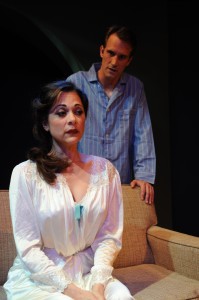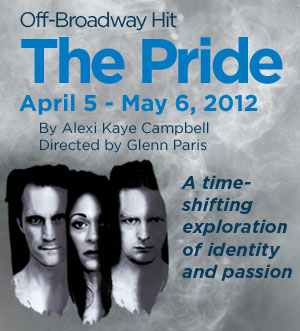WHAT DEFINES PRIDE?
How much of our identity is defined by the era in which we live? How does the constraint or freedom of a particular time mold who we are? Alexi Kaye Campbell’s The Pride, which opens this week at San Diego’s Diversionary Theatre, examines the lives of gay men in two separate stories in two separate societies: one story takes place in the sexually repressive 1950’s, and the other in the more liberal 21st century. The first tale begins in 1958 when we meet Philip and Sylvia, a married couple who are visited by Oliver, the writer of the book she is illustrating. There is an immediate connection between the two men, and an affair develops surrounded by secrecy and danger.
Suddenly, the story shifts to 2008 and characters with the same names, played by the same actors, are now different people: a gay couple, Philip and Oliver, have just broken up because one of them is nearly addicted to anonymous, promiscuous sex, and Sylvia is the friend who comes between them.
 But the convention of the play, which premiered in 2008 at the Royal Court Theatre in London, has the stories flipping back and forth from 1958 to 2008 – we watch how the three characters might have lived, loved and dreamed during two different time periods. The Pride, Campbell’s first play, was awarded The Critics’ Circle Prize for Most Promising Playwright and the John Whiting Award for Best New Play. In January 2010 The Pride was produced for the MCC Theater in New York and directed by Joe Mantello.
But the convention of the play, which premiered in 2008 at the Royal Court Theatre in London, has the stories flipping back and forth from 1958 to 2008 – we watch how the three characters might have lived, loved and dreamed during two different time periods. The Pride, Campbell’s first play, was awarded The Critics’ Circle Prize for Most Promising Playwright and the John Whiting Award for Best New Play. In January 2010 The Pride was produced for the MCC Theater in New York and directed by Joe Mantello.
 For the Diversionary Theatre, Glenn Paris (winner of the 2011 Craig Noel Award for his production of Angels in America Parts 1 and 2) directs this thought-provoking look at love, betrayal and, of course, pride. The Pride features four of San Diego’s most acclaimed actors: Francis Gercke (Philip), Jessica John (Sylvia), Brian Mackey (Oliver), and Dangerfield G. Moore (in a variety of roles). Diversionary Theatre develops new works and produces plays and musicals that explore the issues, characters and stories of the LGBT community in all its complexity and diversity.
For the Diversionary Theatre, Glenn Paris (winner of the 2011 Craig Noel Award for his production of Angels in America Parts 1 and 2) directs this thought-provoking look at love, betrayal and, of course, pride. The Pride features four of San Diego’s most acclaimed actors: Francis Gercke (Philip), Jessica John (Sylvia), Brian Mackey (Oliver), and Dangerfield G. Moore (in a variety of roles). Diversionary Theatre develops new works and produces plays and musicals that explore the issues, characters and stories of the LGBT community in all its complexity and diversity.
 Paris was drawn to the theme of pride in the play, saying, “In 2008, the character of Oliver makes the argument that one should be proud of who they are, in his case a gay man, and the play develops the idea that taking pride in ourselves is political within the context of community.”
Paris was drawn to the theme of pride in the play, saying, “In 2008, the character of Oliver makes the argument that one should be proud of who they are, in his case a gay man, and the play develops the idea that taking pride in ourselves is political within the context of community.”
The Pride may be an era-flipping examination of repression, loyalty, identity and liberation, but the resonating theme is that pride in one’s community is necessary for change.
photos by Ken Jacques
The Pride
Diversionary Theatre in San Diego (Regional Theater)
opens on April 7 and scheduled to close on May 6, 2012
for tickets, call 619.220.0097 or visit http://www.diversionary.org

